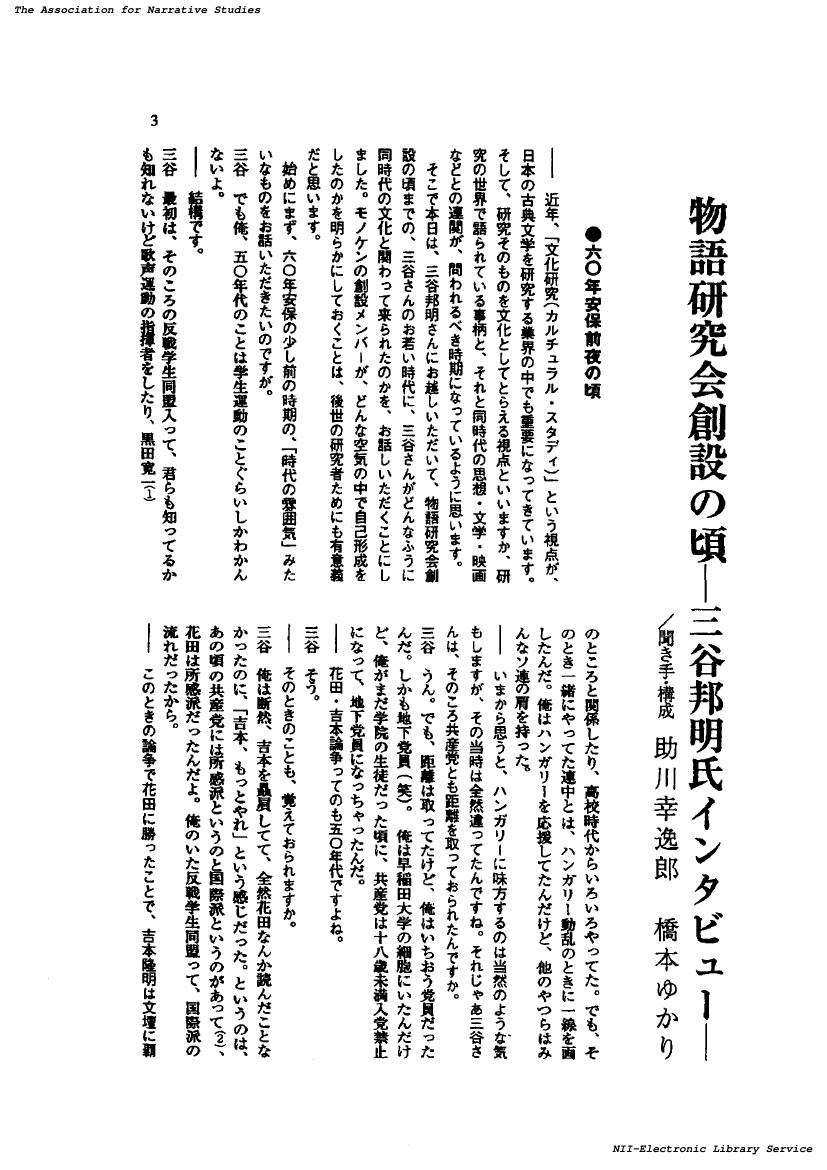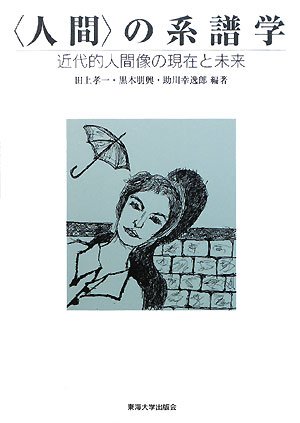10 0 0 0 OA 文学研究と国語教育の未来を拓く
4 0 0 0 OA 物語研究会創設の頃 : 三谷邦明氏インタビュー
- 著者
- 助川 幸逸郎 橋本 ゆかり
- 出版者
- 物語研究会
- 雑誌
- 物語研究 (ISSN:13481622)
- 巻号頁・発行日
- vol.1, pp.3-11, 2001-03-30 (Released:2018-03-27)
- 著者
- 助川 幸逸郎
- 出版者
- 日本文学協会
- 雑誌
- 日本文学 (ISSN:03869903)
- 巻号頁・発行日
- vol.61, no.5, pp.44-54, 2012
<p>風巻景次郎は、文学作品の政治的・社会的背景に言及することが多く、その論調はときに「外在批評」と評された。そのいっぽうで、自身の「読過の印象」から立論をはじめている場合もあり、研究姿勢にぶれを感じさせる。この疑念を解く鍵は、私小説に対する風巻の激烈な批判である。風巻は、日本に真の近代小説が存在しないと考えていた。そして、真の近代小説が存在しうる社会的条件を解明し、この状況を打破したいと願っていた。じぶんのもとめる真の近代小説の像を克明に胸にいだいておくために、みずからの感性は捨てされない。とはいえ、理想の文学の存在条件にせまるためには、社会的背景に目をむけなければならない。風巻の「矛盾」には、彼なりの一貫性があった。</p><p>理想の文学を創作するのではなく、それが生みだされるための制度設計をすること――風巻にとって、文学研究者が何をなすべきかは明確であった。しかし、「真の近代小説」こそが「理想の文学」だと、現在の文学研究者はナイーヴに信じられなくなっている。こうした状況下にあって、文学研究者の使命はどこにあるのかを考えてみたい。</p>
- 著者
- 助川 幸逸郎
- 出版者
- 物語研究会
- 雑誌
- 物語研究 (ISSN:13481622)
- 巻号頁・発行日
- no.11, pp.68-84, 2011-03-31
In 1980s, Consumerism was prevailing in Japan. This brought about a tendency of looking at oneself as a special existence and to think that seeking personal pleasure is more sophisticated than trying to reform the society. These changes strengthened the influence of "OLIVE", which is one of the most popular magazines in 80s, and created the boom of French Theory. Monogatari Kenkyukai, or the Association of Narratology aka Monoken, introduced Textual Analysis as one of the methods to criticize the main stream of academic investigation in the early 70s. But, as with the development of consumer society in 80s, the role of Textual Analysis made a change to provide excuses to cover up the fault of one's own reading. It turned out to be impossible for Monoken to monitor overdoing on the establishment side, as few members of this association could realize that the changes had taken place. Nowadays, study of Japanese Literature has begun to collapse as a system. We, the members of Monoken, should reconsider the meaning of Textual Analysis for rebuilding the narratology up in Japan.
- 著者
- 助川 幸逸郎
- 出版者
- 日本文学協会
- 雑誌
- 日本文学 (ISSN:03869903)
- 巻号頁・発行日
- vol.61, no.5, pp.44-54, 2012-05-10 (Released:2017-11-02)
風巻景次郎は、文学作品の政治的・社会的背景に言及することが多く、その論調はときに「外在批評」と評された。そのいっぽうで、自身の「読過の印象」から立論をはじめている場合もあり、研究姿勢にぶれを感じさせる。この疑念を解く鍵は、私小説に対する風巻の激烈な批判である。風巻は、日本に真の近代小説が存在しないと考えていた。そして、真の近代小説が存在しうる社会的条件を解明し、この状況を打破したいと願っていた。じぶんのもとめる真の近代小説の像を克明に胸にいだいておくために、みずからの感性は捨てされない。とはいえ、理想の文学の存在条件にせまるためには、社会的背景に目をむけなければならない。風巻の「矛盾」には、彼なりの一貫性があった。理想の文学を創作するのではなく、それが生みだされるための制度設計をすること――風巻にとって、文学研究者が何をなすべきかは明確であった。しかし、「真の近代小説」こそが「理想の文学」だと、現在の文学研究者はナイーヴに信じられなくなっている。こうした状況下にあって、文学研究者の使命はどこにあるのかを考えてみたい。
1 0 0 0 OA 宇治大君と〈女一宮〉 ―〈妹恋〉の論理を手がかりとして―
- 著者
- 助川 幸逸郎
- 出版者
- 中古文学会
- 雑誌
- 中古文学 (ISSN:02874636)
- 巻号頁・発行日
- vol.61, pp.18-26, 1998-05-25 (Released:2019-05-18)
- 著者
- 助川 幸逸郎
- 出版者
- 物語研究会
- 雑誌
- 物語研究 (ISSN:13481622)
- 巻号頁・発行日
- vol.14, pp.54-70, 2014-03-31 (Released:2018-03-27)
Shinobu Orikuchi, aka Choku Shaku, famous as a unique poet, was regarded as one of the sympathizers of the Araragi school. This influential school expressed that their own ideal is the poets in the Manyoshu and declared that poems should be written from their unvarnished feelings, derived from their real lives. Orikuchi, however, pointed out that a large number of poems in the Manyoshu were misunderstood to have been based on composers' real lives, implying that these phrases were actually cliches adopted from folk songs and oral works. In the same way, he pointed out those ardent expressions in women verses composed in the Nara and Heian era were stereotypes in Utagaki, which were meetings with the intention of finding a sexual partner. He was unwilling to accept passionate words in poetical works as the faithful reflection of author's feelings in their mind. What were the reasons behind such an attitude? In this paper, I find the reasons for this in the poetical conditions peculiar to modern Japan.
- 著者
- 助川 幸逸郎
- 出版者
- 物語研究会
- 雑誌
- 物語研究 (ISSN:13481622)
- 巻号頁・発行日
- no.10, pp.18-34, 2010-03-31
In 1985 Murakami Ryu published a book entitled The Spleen of a Man Called Tennis Boy depicting the shift in Japanese society when a large number of people began to regard themselves as middle class and lead luxurious life. This change was related to the decline of the USA manufacturing industry. The author provides a substantial amount of false information on popular brand names that appear in this text due to lack of exposure to such goods and knowledge of their proper use. As such he comes to represent the typical "new middle-class Japanese" because few people were accustomed to such merchandises in the mid-80s. In this paper, I discuss the changes within Japanese society in 1980s and reflect on the significance that year 1983 had for the history of modern Japan. By doing so, I hope to cast light on the new path that Japanese society may embark on in the 2010s.
1 0 0 0 「人間」の系譜学 : 近代的人間像の現在と未来
- 著者
- 田上孝一 黒木朋興 助川幸逸郎編著
- 出版者
- 東海大学出版会
- 巻号頁・発行日
- 2008



